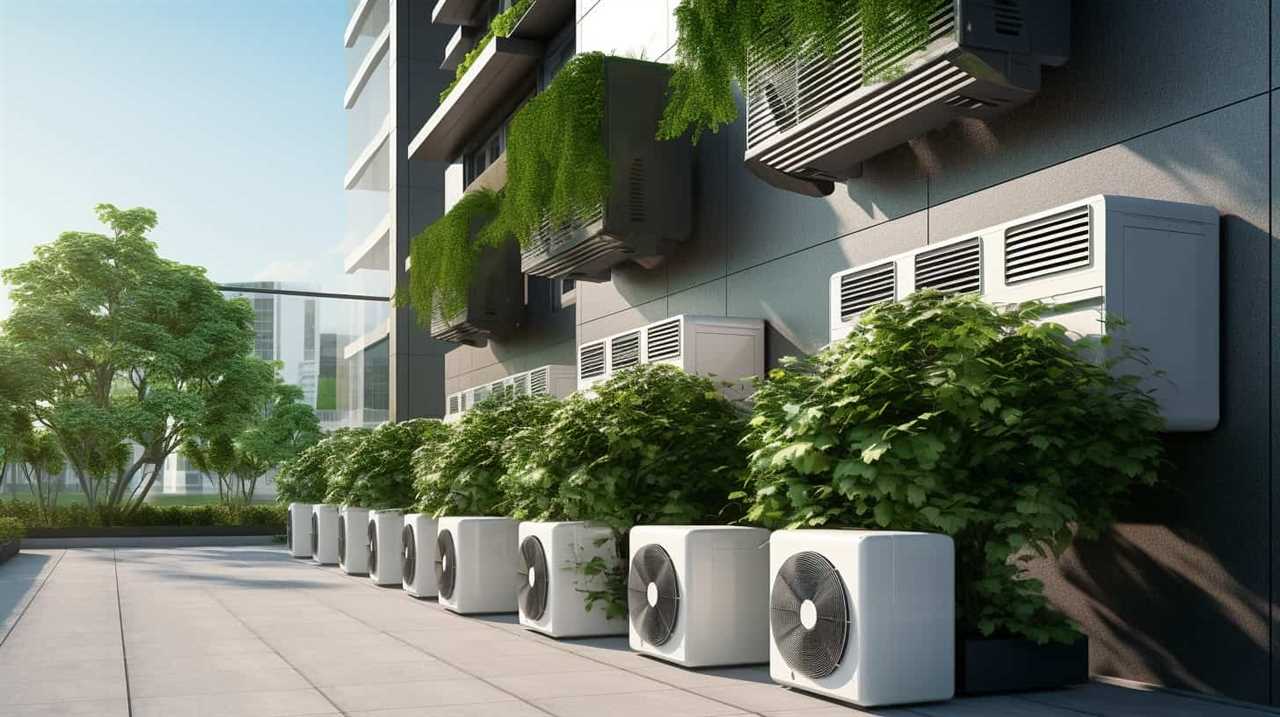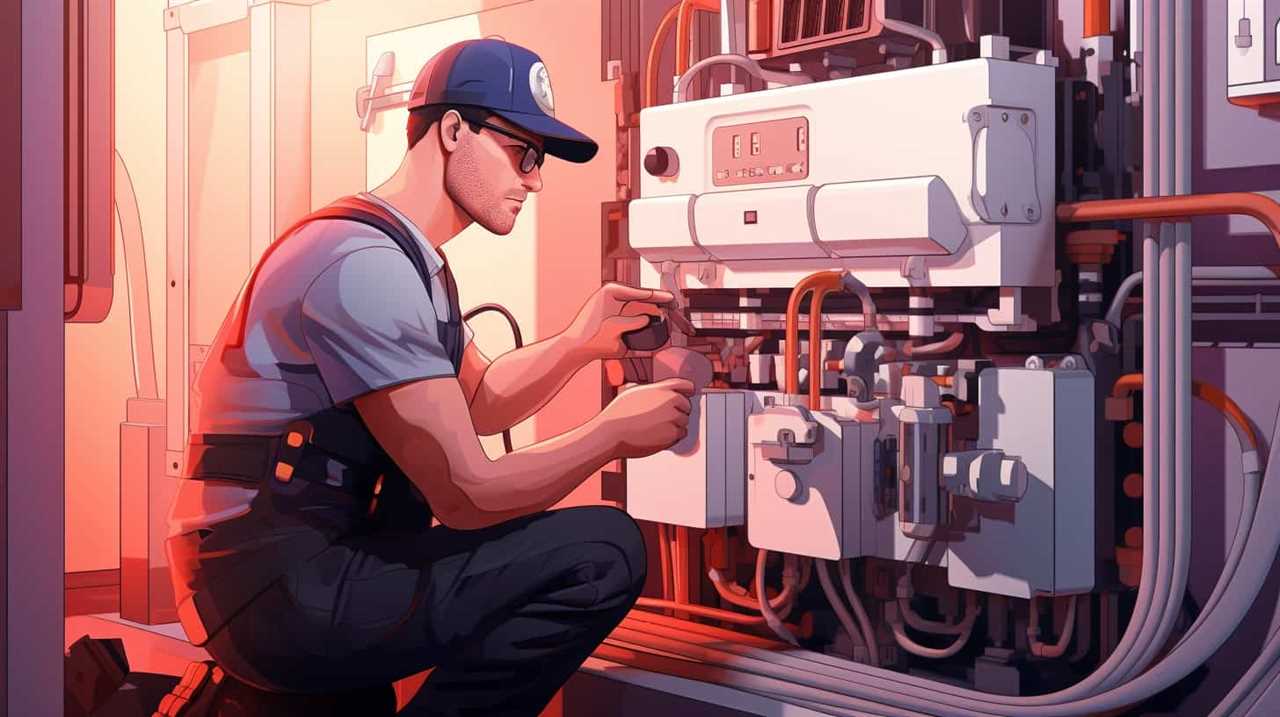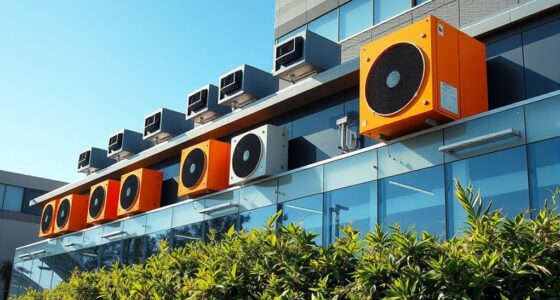We recognize that incorporating heat pump systems into commercial properties can be a complex task. However, we are here to help guide you through this process.
Did you know that heat pumps can provide up to 50% energy savings compared to traditional heating and cooling systems?
In this article, we will guide you on how to choose the right heat pump, optimize energy efficiency, and overcome potential challenges.
Let’s dive into the world of heat pump technology for commercial buildings!

Key Takeaways
- Heat pumps in commercial buildings can provide significant energy savings, up to 50%, compared to traditional heating and cooling systems.
- Implementing heat pump technology can reduce energy consumption and minimize carbon emissions, making it a cost-effective and environmentally sustainable option.
- Heat pumps offer efficient heating and cooling capabilities, ensuring a comfortable indoor environment for commercial buildings.
- The selection of the right type and size of heat pump is crucial, taking into account factors like building size, climate conditions, and energy requirements.
Benefits of Heat Pump Technology in Commercial Buildings
In our article on implementing heat pump technology in commercial buildings, let’s now explore the benefits it brings.
Heat pump technology offers remarkable cost effectiveness and environmental sustainability. By using renewable energy sources, such as air, water, or ground, heat pumps can significantly reduce energy consumption and minimize carbon emissions. This makes them an excellent choice for commercial buildings aiming to lower their operational costs and environmental impact.
Heat pumps also provide efficient heating and cooling capabilities, ensuring a comfortable indoor environment throughout the year. Additionally, their versatility allows for integration with other renewable energy systems like solar panels, further enhancing their sustainability.
Understanding the different types of heat pumps for commercial applications will enable us to make informed decisions about the most suitable option for each building’s specific requirements.

Understanding the Different Types of Heat Pumps for Commercial Applications
Before we delve into the different types of heat pumps for commercial applications, let’s start by understanding the basics.
Heat pumps work by transferring heat from one place to another using a refrigerant. They’re known for their efficiency and cost-effectiveness, as they can provide both heating and cooling in a single system.
When choosing the right type of heat pump for a commercial building, factors such as the size of the space, climate conditions, and energy requirements need to be considered.
Heat Pump Basics
We can gain a better understanding of the different types of heat pumps for commercial applications by exploring the basics of heat pump technology. Heat pumps are devices that transfer heat from one location to another, using a small amount of energy. There are several types of heat pumps commonly used in commercial buildings, including air-source heat pumps, water-source heat pumps, and geothermal heat pumps.

Air-source heat pumps extract heat from the outdoor air and transfer it indoors, or vice versa, depending on the desired temperature. These heat pumps are relatively easy to install and maintain, making them a popular choice for commercial applications.
Water-source heat pumps, on the other hand, use water as the heat source or sink. These pumps are more efficient but require a water source, such as a lake or a well, which may limit their installation options.
Geothermal heat pumps utilize the stable temperature of the ground to transfer heat. These pumps are highly efficient and can provide both heating and cooling for commercial buildings. However, they require extensive installation and maintenance procedures, including drilling boreholes into the ground and regular checks on the system.
Understanding the basics of heat pump technology and the different types of heat pumps available for commercial applications is essential for successful heat pump installation and maintenance. By selecting the right type of heat pump for a specific commercial building, owners can maximize energy efficiency and reduce operational costs.

Regular maintenance, including cleaning filters, checking refrigerant levels, and inspecting the system for any issues, is crucial for ensuring the optimal performance of the heat pump and prolonging its lifespan.
Efficiency and Cost
By evaluating the efficiency and cost of different types of heat pumps, we can gain a better understanding of their suitability for commercial applications. Heat pumps utilize renewable energy sources such as the air, ground, or water, to transfer heat from one place to another. This process requires less energy compared to traditional heating and cooling systems, resulting in significant cost savings in the long run.
The efficiency of heat pumps is measured by the Coefficient of Performance (COP), which indicates the amount of heat produced per unit of energy consumed. Higher COP values mean greater efficiency and lower operating costs. Additionally, by using renewable energy sources, heat pumps contribute to a more sustainable and environmentally friendly approach to heating and cooling.
Transitioning from the discussion of efficiency and cost, let’s now move on to choosing the right type of heat pump for commercial applications.

Choosing the Right Type
Our goal is to choose the right type of heat pump for commercial applications, ensuring optimal performance and energy efficiency. When evaluating options, it’s important to consider the performance comparison of different types of heat pumps.
Here are three key factors to consider:
-
Energy Efficiency: Look for heat pumps that have high coefficients of performance (COP) and energy efficiency ratios (EER). These ratings indicate how effectively the heat pump converts energy into heat or cooling.
-
Capacity and Size: Consider the heating and cooling needs of your commercial building. Choose a heat pump that can meet the required capacity while fitting within the available space.

-
Climate Compatibility: Different heat pumps have varying performance characteristics based on the climate they operate in. Consider the local climate and choose a heat pump that’s designed to perform well in those conditions.
Sizing and Selecting the Right Heat Pump for Your Commercial Building
When it comes to selecting the right heat pump for your commercial building, it’s crucial to consider efficiency and proper sizing.
Efficient heat pump selection involves evaluating the performance ratings and energy efficiency of different models.
Proper sizing considerations involve analyzing factors such as the building’s size, insulation levels, and specific heating and cooling requirements to ensure the heat pump can adequately meet the demands of the space.

Efficient Heat Pump Selection
Selecting the right heat pump for your commercial building involves carefully sizing and considering various efficiency factors. When it comes to efficient heat pump selection, there are three key factors to keep in mind:
-
Heat Pump Installation Process: It’s crucial to ensure that the heat pump is installed correctly to maximize its performance and efficiency. Proper installation includes proper sizing, adequate insulation, and appropriate ductwork design.
-
Heat Pump Efficiency Standards: Look for heat pumps that meet or exceed industry efficiency standards. Consider energy efficiency ratings such as Seasonal Energy Efficiency Ratio (SEER) and Heating Seasonal Performance Factor (HSPF). Higher ratings indicate better efficiency and lower operating costs.
-
Load Calculation: Properly sizing the heat pump is essential to ensure optimal performance. Conduct a load calculation to determine the heating and cooling requirements of your commercial building. Factors such as building size, insulation levels, and climate conditions should all be taken into account.

By considering these efficiency factors, you can make an informed decision and select a heat pump that meets the specific needs of your commercial building.
Now, let’s move on to the next section to discuss proper sizing considerations.
Proper Sizing Considerations
To ensure optimal performance, we need to accurately size and select the right heat pump for our commercial building. Proper sizing considerations are crucial in minimizing energy consumption and reducing environmental impact. By selecting a heat pump that is too small, it may struggle to meet the heating and cooling demands of the building, resulting in increased energy usage and inefficiency. On the other hand, choosing a heat pump that is too large can lead to frequent cycling on and off, wasting energy and potentially shortening the lifespan of the equipment.
To determine the appropriate size, several factors must be considered, including the building’s square footage, insulation levels, number of occupants, and climate conditions. Conducting a thorough load calculation is essential to accurately assess the heating and cooling requirements. This calculation accounts for factors such as heat gain and loss through windows, walls, and roofs, as well as internal heat sources.

It is important to note that the size of the heat pump should match the load calculation, not the existing HVAC system. Upgrading to a more efficient heat pump may require adjustments to the distribution system, such as resizing ductwork or adding additional vents.
In order to assist in the selection process, here is a table that outlines the recommended heat pump sizes based on the building’s square footage:
| Square Footage | Heat Pump Size |
|---|---|
| Less than 1,000 | 1.5 – 2 tons |
| 1,000 – 1,500 | 2 – 2.5 tons |
| 1,500 – 2,000 | 2.5 – 3 tons |
| 2,000 – 2,500 | 3 – 3.5 tons |
| 2,500 – 3,000 | 3.5 – 4 tons |
It is important to consult with a qualified HVAC professional to ensure accurate sizing and selection of the heat pump for your specific commercial building. By taking the time to properly size the heat pump, you can maximize energy efficiency, reduce environmental impact, and create a comfortable indoor environment for your occupants.
Installation and Maintenance Considerations for Commercial Heat Pump Systems
We need to consider the installation and maintenance requirements for commercial heat pump systems. Proper installation is crucial to ensure optimal performance and efficiency of the heat pump system. Here are three key considerations for installation and maintenance:

-
Site assessment: Conduct a thorough site assessment to identify any installation challenges such as limited space, accessibility issues, or structural limitations. This assessment will help determine the best location for the heat pump system and ensure that it meets all safety and building code requirements.
-
Expert installation: It’s essential to hire qualified technicians who are experienced in installing commercial heat pump systems. They should follow manufacturer guidelines and industry best practices to ensure proper installation, including correct sizing, proper ductwork design, and accurate refrigerant charging.
-
Regular maintenance: Implementing a proactive maintenance plan is crucial for the long-term performance and efficiency of the heat pump system. This includes regular filter replacement, inspection of electrical connections, coil cleaning, and refrigerant level checks. Timely maintenance can help identify and resolve potential issues before they escalate, ensuring the smooth operation of the system.
Optimizing Energy Efficiency With Heat Pump Technology in Commercial Buildings
Let’s explore how we can maximize energy efficiency by utilizing heat pump technology in commercial buildings. Heat pumps have the potential to significantly increase energy savings and provide environmental benefits.

One way to optimize energy efficiency is by utilizing variable speed drives (VSDs) in heat pump systems. VSDs allow for precise control of the compressor speed, allowing the system to match the load requirements more accurately. This results in reduced energy consumption and increased efficiency.
Additionally, regular maintenance and proper insulation of the building can further enhance energy efficiency. Regular maintenance ensures that the system operates at its peak performance, while proper insulation minimizes heat loss or gain.
Overcoming Challenges and Potential Solutions in Implementing Heat Pump Technology in Commercial Buildings
Although implementing heat pump technology in commercial buildings may present challenges, there are potential solutions that can be explored. Retrofitting existing buildings with heat pump systems can be a complex task, especially when considering the unique requirements of each building. However, with careful planning and execution, these challenges can be overcome, and significant energy savings can be achieved.
Here are three potential solutions to overcome challenges in retrofitting heat pump technology in commercial buildings:

-
Conduct a thorough energy audit: Before implementing a heat pump system, it’s crucial to assess the building’s energy usage and identify areas of improvement. This will help determine the most suitable heat pump technology and optimize its performance.
-
Upgrade the building envelope: Improving insulation, sealing air leaks, and upgrading windows can enhance the energy efficiency of the building. This reduces the workload on the heat pump system and increases its overall effectiveness.
-
Optimize system design and controls: Proper system design, sizing, and control strategies play a vital role in maximizing energy savings. Working with experienced HVAC professionals can ensure that the heat pump system is tailored to the building’s needs and operates at its highest efficiency.
Frequently Asked Questions
Are Heat Pump Systems Suitable for All Types of Commercial Buildings?
Heat pump systems have limitations and may not be suitable for all types of commercial buildings. Factors such as building size, insulation, and heating/cooling requirements affect the cost effectiveness of heat pump systems in different commercial settings.

Is It Possible to Retrofit an Existing Commercial Building With a Heat Pump System?
Yes, it is possible to retrofit an existing commercial building with a heat pump system. However, there are challenges to consider, such as space limitations and the need for modifications to the existing HVAC infrastructure. Despite these challenges, the benefits of heat pump retrofitting can include energy efficiency, cost savings, and improved comfort.
How Long Is the Typical Lifespan of a Commercial Heat Pump System?
The typical lifespan of a commercial heat pump system varies depending on maintenance requirements. Regular maintenance can extend the system’s life, ensuring energy efficiency benefits are maximized.
Can a Heat Pump System Be Used as the Sole Source of Heating and Cooling in a Commercial Building?
Yes, a heat pump system can be used as the sole source of heating and cooling in a commercial building. However, it is important to consider the limitations and benefits of heat pump technology in commercial buildings.
Are There Any Government Incentives or Rebates Available for Implementing Heat Pump Technology in Commercial Buildings?
There are government incentives and rebates available for implementing heat pump technology in commercial buildings. These incentives can provide financial benefits and make the adoption of heat pump systems more affordable for businesses.

Conclusion
Implementing heat pump technology in commercial buildings offers numerous benefits, such as increased energy efficiency and cost savings. By understanding the different types of heat pumps, selecting the right one, and considering installation and maintenance factors, businesses can optimize their energy usage.
Despite challenges, like initial costs and system complexity, the long-term advantages make it a worthwhile investment. Just like a heat pump efficiently transfers heat, embracing this technology can warm the hearts of both business owners and the environment.









